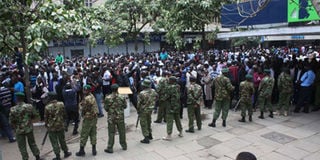Key lessons for election team as Kenyans return to ballot

Police officers provide security outside the Supreme Court in Nairobi after September 1,2017 ruling that nullified the August 8 presidential election. PHOTO | ANTHONY OMUYA | NATION MEDIA GROUP
What you need to know:
- Supreme Court declared that the presidential election was null and void and ordered the IEBC to organise new polls within 60 days.
- The fact that the IEBC dragged its feet in providing Nasa with access to its servers, as ordered by the Supreme Court, only further fuel suspicions.
- By the time that Nasa brought its petition, thousands of forms 34A were still not available, which produced an information black hole.
- Then there is the pressing need to address the criminalisation of the poor and associated heavy-handed security response to actual or potential protest.
On Friday, in a landmark ruling, the Supreme Court declared in a majority decision that the Independent Electoral and Boundaries Commission (IEBC) had not conducted the presidential election of August 8 in accordance with the Constitution and applicable laws. In turn, the court declared that the presidential election was null and void and ordered the IEBC to organise new polls within 60 days.
Given that the court is yet to issue details of its reasoning (which it will do within 21 days), it is impossible to give a detailed analysis of the electoral process.
Instead, this piece simply highlights a few of the problems that demand attention.
First, and most importantly, while new technology – or the Kenya Integrated Elections Management System (Kiems) – worked relatively well for the registration and identification of voters, it failed when it came to the transmission of votes when many polling stations failed to send the results and a scan of the same.
FORM 34B
As the IEBC has argued, the final results announced should be calculated – not from these transmitted results – but from a tally of the constituency level results (forms 34B), which are themselves a tally of polling station level results (forms 34A).
However, the widespread failure to scan and send the forms 34A as planned – and subsequent evidence, amongst other things, of unofficial logins and the addition and deletion of forms – raises questions about whether the process was intentionally tampered with so as to provide President Kenyatta with a clear and consistent lead.
The fact that the IEBC dragged its feet in providing Nasa with access to its servers, as ordered by the Supreme Court, only further fuels such suspicions.
The question then is how to ensure that this transmission system works so that it can provide the intended check.
This leads to a second point, which is that, since final results should be calculated from forms 34A and 34B, it is critical that copies be made publicly available.
PETITION
However, by the time that Nasa brought its petition, thousands of forms 34A were still not available, which produced an information black hole.
Suspicions were then exacerbated by IEBC communications. As Nic Cheeseman notes, “At a number of points … it was intimated (by IEBC officials) that almost all the 34A forms had been received and were being put online only for them to fail to materialise … it is hard to avoid the conclusion that we were deliberately misled.”
The need for forms 34A to be made quickly available goes hand-in-hand with another; namely, for parties to invest more in party agents.
In short, neither Jubilee nor Nasa had agents in every polling station on August 8, while many were focused on lower level races, and failed to keep and send copies of the relevant forms to their parties.
This is problematic as one of the best ways to protect the vote would be for party agents to send a picture of forms 34A from every polling station to a) a central party tallying centre and b) to agents at IEBC constituency tallying centres.
PARTY AGENTS
The latter is important as it would allow party agents to cross check the results announced at a stage where disputed forms 34A could be relatively easily checked against those kept in the sealed ballot boxes.
The fairness of the elections also extends to the evenness of the playing field. One problem in this regard, was the widespread misuse of State resources, which, as the European Union Observation Mission highlighted in its preliminary statement, benefited Jubilee at the national level, but also county-level incumbents across the country.
This is in contravention of the Electoral Code of Conduct, which needs to be more effectively enforced.
SECURITY RESPONSE
Then there is the pressing need to address the criminalisation of the poor and associated heavy-handed security response to actual or potential protest.
There are also other issues to consider in the longer-term. This includes the development of a more effective means of updating the electoral register so as to minimise the number of dead people listed; the question of whether to extend the timelines for the filing and hearing of presidential petitions; and need to regulate individual and party finance.
Gabrielle Lynch, Professor of Comparative Politics, University of Warwick, UK ([email protected]; @GabrielleLynch6)





